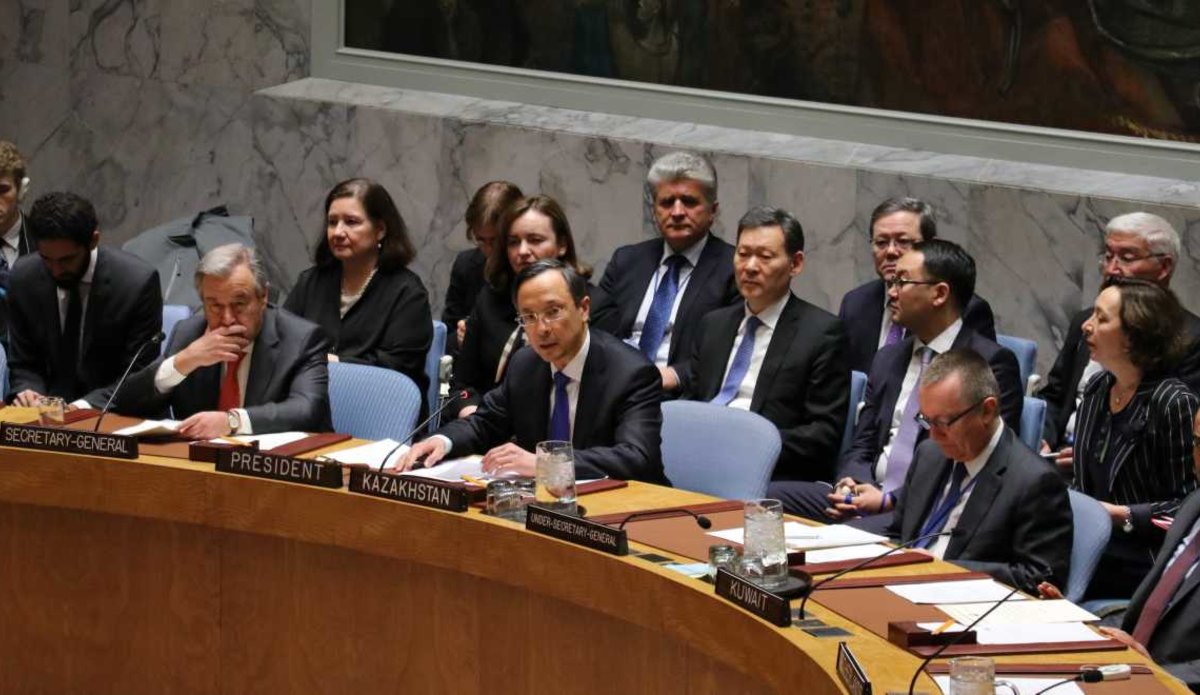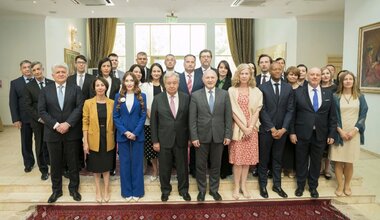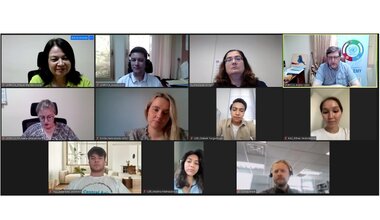Statement by the President of the Security Council
NY, January 25, 2018: At the 8162nd meeting of the Security Council, held on 19 January 2018, in connection with the Council’s consideration of the item entitled “Maintenance of international peace and security”, the President of the Security Council made the following statement on behalf of the Council:
“The Security Council reaffirms its commitment to the sovereignty, independence and territorial integrity of Afghanistan and the Central Asian States.
“The Security Council expresses its continued support to the Secretary-General’s call-to-action to avert threats in Afghanistan and Central Asia, encourages making conflict prevention and resolution central to the work of the UN system in the region while stressing the importance of preventive diplomacy, inter alia, through engaging constructively with Member States to ensure long-term stability, security and development.
“The Security Council recalls its Resolution 2344 (2017) and recognizes that there can be no purely military solution to Afghanistan, underlines the importance of an inclusive Afghan-led and -owned peace process for the long-term prosperity and stability of Afghanistan, and expresses its full support to the Government of Afghanistan to achieve peace and reconciliation, including through peace and security cooperation with the wider region, including the Central Asian states.
“The Security Council recognizes ongoing international efforts to advance peace and stability in Afghanistan and calls on all countries in the region and international community to renew their sincere efforts to achieve peace and reconciliation.
“The Security Council underscores the importance of continued progress on electoral reform and towards the holding of credible and inclusive parliamentary elections in 2018 and presidential elections in 2019. It commends efforts by UN Assistance Mission in Afghanistan (UNAMA) and UNDP in support of this area and encourages them to intensify their support to the Afghan electoral management bodies.
“The Security Council reiterates its concern over the continuing threats to the security and stability of Afghanistan posed by the Taliban, including the Haqqani network, as well as by Al-Qaida, ISIL (Da’esh) affiliates and other terrorist groups, violent and extremist groups, illegal armed groups, criminals, and those involved in the production, trafficking or trade of illicit drugs; notes in this regard the potential threats to the region, including to the Central Asian states; and calls upon all states in this regard to effectively implement all relevant Security Council resolutions, including those relating to counter-terrorism, and to strengthen their international and regional security cooperation to enhance information-sharing, border control, law enforcement and criminal justice to better counter the threats posed, including from returning foreign terrorist fighters.
“The Security Council takes note of the efforts of the Counter-Terrorism Committee (established pursuant UNSCR 1373) and its Executive Directorate to assess and monitor implementation of resolutions 1373, 1624, 2178, 2396 and other relevant resolutions on terrorism by Afghanistan and countries of the region, and acknowledges recommendations provided by the Committee, including in the area of providing of technical assistance.
“The Security Council stresses the importance of advancing regional, interregional and international cooperation to achieve long-term peace, stability and sustainable development in Afghanistan and Central Asia and supports the joint efforts of countries of the region towards the enhancement of a zone of peace, cooperation and prosperity including through the different platforms for cooperation.
“The Security Council welcomes the contribution of the Central Asian countries to ensuring the stability and development of Afghanistan and the intensification of long-term cooperation, discussions and coordination among them, using various joint platforms and fora, including through regular meetings at high level.
“The Security Council reiterates the importance of increasing the full and effective participation and leadership of women in decision-making, including in national, regional, and international institutions and mechanisms for the prevention and resolution of conflict, as well as efforts to prevent and combat terrorism, and the importance of integrating gender perspectives across all discussions pertinent to sustaining peace in Afghanistan and the Central Asia region and supports commitments to the implementation of UNSCR 1325 and subsequent resolutions on women, peace and security in the region. The Security Council stresses the need to strengthen policies and mechanisms in Afghanistan to empower women politically and economically, to increase the number of women in the security forces in an environment conducive to women’s safety and development, and to mitigate violence against women by supporting the provision of services for survivors of sexual and gender-based violence.
“The Security Council underlines the importance of paying due attention to child protection concerns within peace and reconciliation efforts in Afghanistan and calls on all parties to take the necessary measures to do so.
“The Security Council commends the role of the UNAMA and the UN Regional Centre for Preventive Diplomacy for Central Asia (UNRCCA), and their respective UN Secretary General Special Representatives, in the implementation of their mandates as per Resolution 2344 (2017) and Security Council documents S/2007/279 and S/2007/280, respectively and for collaborating closely to facilitate the bilateral and multilateral engagement of Central Asian States with Afghanistan.
“The Security Council welcomes the involvement of Afghanistan in the Central Asian regional mechanisms for cooperation on counter-terrorism, including in implementing the Joint Plan of Action (JPoA) for the implementation of the UN Global Counter-Terrorism Strategy and expresses its support for the roles of the UN Office of Counter-Terrorism and UNRCCA in providing support to the practical realization of the JPoA and the Ashgabat Declaration of 13 June 2017.
“The Security Council underscores the importance of close coordination between Afghanistan and the Central Asian States in combating the significant increase in the cultivation, production, trade and trafficking of illicit drugs in Afghanistan, as reflected in the Afghanistan Opium Survey published by the UN Office on Drugs and Crime (UNODC) on 15 November 2017, which continue to pose a threat to peace and stability in the region and beyond, and emphasizes the need for enhanced regional and international support of Afghanistan’s National Drug Action Plan (NDAP).
“The Security Council in this regard appreciates the work of UNODC, calls upon States to strengthen international and regional cooperation to counter the threat to the international community posed by the cultivation, production, trafficking, and consumption of illicit drugs originating in Afghanistan which significantly contribute to the financial resources of the Taliban and its associates, and to act in accordance with the principle of common and shared responsibility in addressing the drug problem of Afghanistan, including through cooperation against the trafficking in illicit drugs and precursor chemicals, and welcomes cooperation between Afghanistan and Central Asian states and relevant regional and international organizations and initiatives.
“The Security Council commends the efforts of UNAMA and UNRCCA, in collaboration with the UNODC, and relevant regional organizations and fora, to help the Central Asian States and Afghanistan address the narcotics problem.
“The Security Council welcomes commitments to continued cooperation on border management and border security by Central Asian countries and Afghanistan, commends efforts by UN agencies to increase their capacities in this area, and encourages donor countries and regional and international organizations to intensify capacity building efforts.
“The Security Council welcomes the contribution of Central Asian States to non-proliferation, including to the Treaty on a Nuclear-Weapon-Free Zone in Central Asia (CANWFZ), and encourages their further cooperation in preventing, detecting and responding to illicit trafficking of nuclear and other radioactive materials.
“The Security Council welcomes efforts taken in the region to enhance dialogue and collaboration and to advance shared goals of economic development and prosperity across the region and expresses its appreciation for national, sub-regional and regional initiatives and efforts to advance policy, infrastructure, trade, financial and people-to-people connectivity in Afghanistan, Central Asia and beyond.
“The Security Council emphasizes that, in order to support Afghanistan emerging sustainably from conflict, there is a need for a comprehensive and integrated approach that incorporates and strengthens coherence between all sectors, including political, security, development, and human rights, and encourages ongoing efforts in this regard, including to strengthen the rule of law, and stresses the importance, where appropriate, of advancing a regional approach as a means to minimize conflict and enhance effectiveness and efficiency of interventions.
“The Security Council encourages relevant entities of the UN system to work towards preventing conflict and notes in this regard the importance of addressing the conflict in Afghanistan in a comprehensive manner that seeks to use preventive diplomacy tools in support of durable peace and prosperity in Afghanistan and in the wider region.
“The Security Council notes in this regard the importance of maximizing the efficiency and efficacy of the work of the UN in Afghanistan and Central Asia, including through enhanced coordination across the UN system.
“The Security Council commends the efforts of the relevant UN agencies in promoting SDGs regionally and supports the activities of the UN Special Programme for the Economies of Central Asia (SPECA), which Afghanistan has joined, and the Regional Economic Cooperation Conference on Afghanistan (RECCA), as platforms for cross-border economic dialogue, and encourages intensified ownership and contribution by Central Asian States.”
 UN
UN





